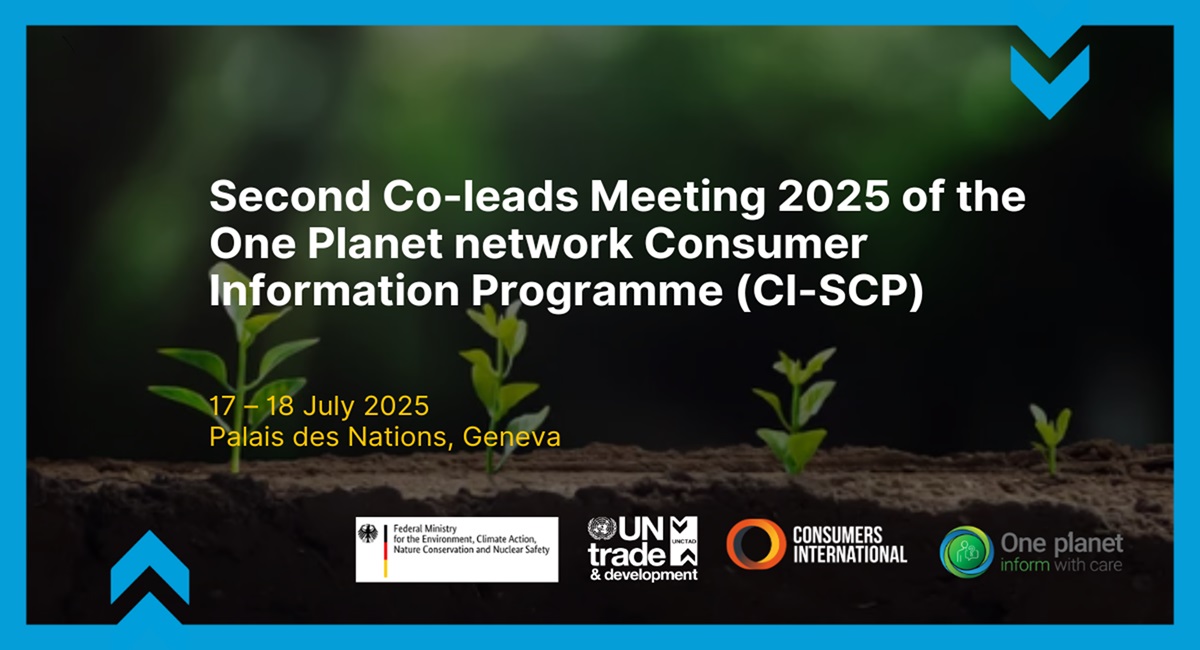
The Consumer Information for Sustainable Consumption and Production (CI-SCP) Programme is a joint initiative of the One Planet network, co-led by UNCTAD, Germany's Federal Ministry for the Environment, Nature Conservation, Nuclear Safety and Consumer Protection, and Consumers International.
The programme is hosted in the United Nations Environment Programme and focuses on implementing and supporting projects, conducting research, advocating for policies, and facilitating collaboration opportunities for individuals and organizations interested in promoting sustainable consumption practices among consumers.
The second co-leads meeting, scheduled for 17–18 July 2025 at the Palais des Nations in Geneva, hosted by UNCTAD serves as a critical opportunity to reflect on recent developments, review programme evaluations, and chart a focused path forward.
Objectives:
- Identify thematic priorities across the consumer information for sustainable consumption and production agenda that the programme should address or reinforce.
- Streamline and integrate these thematic priorities within the programme’s existing focus areas and groups, potentially identifying new areas of work.
- Align on one strategic and feasible goal for each of the identified focus areas and groups.
- Ensure each priority contributes meaningfully to the overarching goal of the programme.
- Outline conceptual success metrics to guide work by the Coordination Desk and corresponding groups.
- Learn about the main outputs of the technical cooperation project on “Advancing consumer information and consumer protection in alignment with multilateral environmental agreements: though a synergistic partnership between UNEP and UNCTAD.
- If possible, define main objectives for next MAC meeting agendas in 2025 – 2026.
Preparations prior to the meeting:
- Consumers International will consult co-leads about potential thematic priorities for the programme.
- Coordination Desk will compile rapid assessment for each of the below suggested focus areas and groups. These assessments will be presented as basis for discussions and decisions.
Purpose of the event:
The purpose of the Second Co-leads Meeting is to align strategic priorities for the Consumer Information Programme (CI-SCP) by identifying key thematic areas that the programme should address and reinforce.
The meeting will enable co-leads to integrate these priorities into existing focus areas and working groups, establish one clear and feasible goal for each, and ensure that all goals collectively support the overarching objective of the programme. In addition, the meeting will focus on outlining conceptual success metrics to guide implementation efforts and defining key themes for upcoming Multistakeholder Advisory Committee meetings in 2025–2026.
This collaborative process will help strengthen coordination, promote accountability, and provide a clear roadmap for the programme’s future direction.
Objectives:
Thematic Priorities
• Review of evaluations by Coordination Desk Summary of recent developments, challenges, and emerging opportunities
• Presentation of proposed themes Group discussion to refine or identify missing priorities
- Mapping Thematic Priorities to Focus Areas
• Identify one strategic and feasible goal per area
• Note overlaps and synergy opportunities
Coherence & Strategic Fit Check
• Ensure all goals contribute to overarching programme objective
• Discuss inter-dependencies, continuity, and scalability
Outlining Conceptual Success Metrics
• Discuss indicators for each goal
• Identify qualitative and quantitative aspects
Framing Future MAC Agendas
• Define 1–2 key themes for each 2025–2026 MAC meeting.
• Align with emerging priorities and programme goals
Key focus areas:
• Collaboration with other OPN programmes
• Business engagement
• Government engagement
Expected Outcomes:
The Second Co-leads Meeting 2025 is expected to agree on a shared strategic direction for the Consumer Information Programme (CI-SCP), with co-leads reaching consensus on a refined set of thematic priorities that address current challenges and opportunities.
These priorities will be clearly mapped to the programme’s existing focus areas and groups, with each area aligned around a specific and actionable goal.
The meeting will also establish a foundation for measuring progress by outlining conceptual success metrics that reflect both qualitative and quantitative impacts. In addition, roles and responsibilities for implementation and follow-up will be clarified to ensure accountability and sustained momentum.
Finally, the meeting will serve as a platform for shaping the agendas of upcoming Multi-stakeholder Advisory Committee meetings, anchoring them in the programme’s evolving strategic framework.
Co-Leads:
• Ulf Jaeckel, German Federal Ministry for the Environment, Nature Conservation and Nuclear Safety
• Helena Leurent, Consumers International
• Arnau Izaguerri, UNCTAD
Coordinators:
• Rafael Ponte -Consumers International
• Sophia Groll -UNEP
• Arnau Izaguerri- UNCTAD


